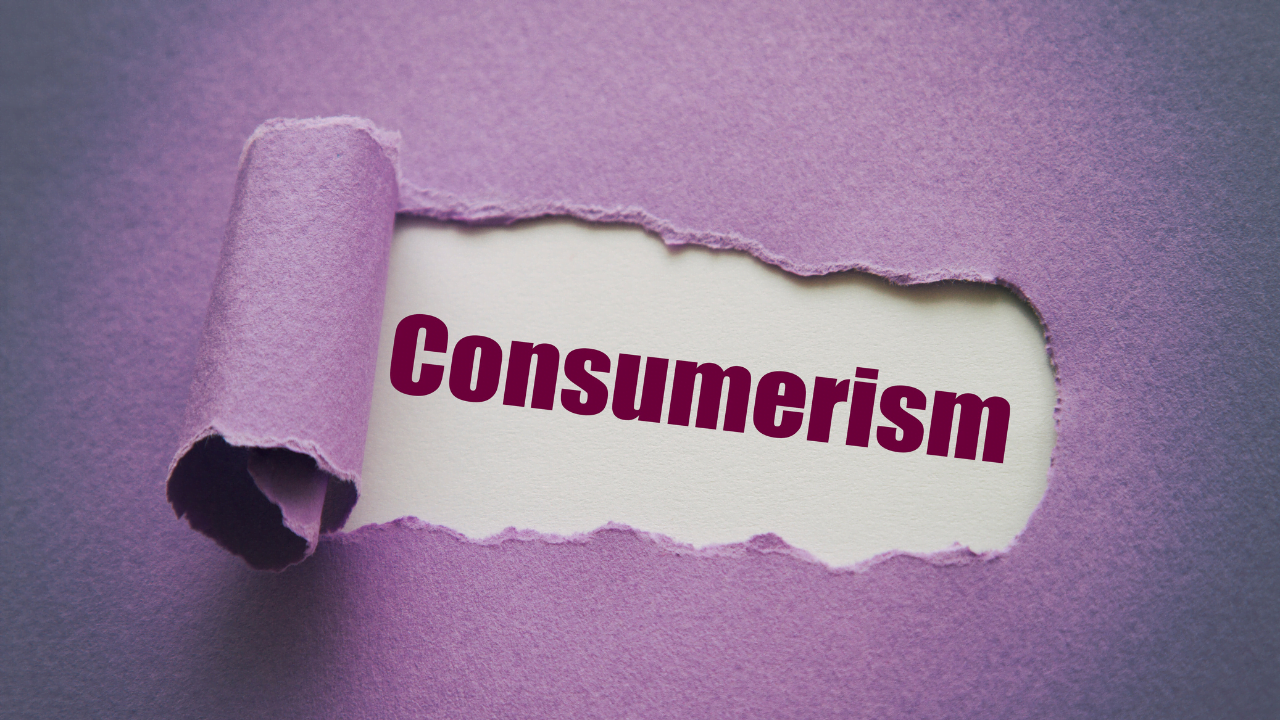No products in the cart.
Christian Perspectives on Detoxing from Consumerism
This post contains paid and/or affiliate links. I make a small commission at no extra cost to you. Please see our Privacy Policy.
Christian perspectives on detoxing from consumerism. In a society driven by the desire for material goods and endless consumption, we as Christians must reflect on our relationship with consumerism and its impact on the Earth and our spiritual well-being.
Through the teachings of the Orthodox Church and the insights of the Ecumenical Patriarch Bartholomew, we will explore the adverse effects of consumerism, the role of advertising, the culture of disposable products, and the influence of culture and social pressure.
By understanding these perspectives, we can make conscientious choices that align with our Christian values and promote a more sustainable and harmonious way of life. Join us as we delve into this critical topic and discover how we can detox ourselves from the grip of consumerism.
The Ecumenical Patriarch’s Perspective on Consumerism
The Ecumenical Patriarch Bartholomew has a profound perspective on the detrimental effects of consumerism on the planet and human society. He shows how consumerism arises from a disconnect between oneself, the land, and God, leading to avarice and greed. It is an insatiable desire for material possessions that only leaves individuals feeling empty and disconnected from their true selves.
The Ecumenical Patriarch also draws attention to the alarming disparities in resource distribution. He points out that the wealthiest 20% of the world’s population consumes most of the Earth’s resources. For instance, despite comprising only 4% of the global population, the United States utilizes a significant portion of the world’s energy and materials.
In the face of such imbalances, it becomes evident that consumerism perpetuates environmental and socio-economic inequalities. The Ecumenical Patriarch’s perspective emphasizes the need to address the negative consequences of consumerism for both individuals and society.
The Impact of Consumerism on the Environment
Consumerism profoundly impacts the environment, leading to pollution, degradation, and destruction of the Earth’s ecosystems. The consequences are far-reaching and affect not only the natural world but also society as a whole.
1. Excessive Consumption
Consumerism promotes accumulating goods and services beyond necessary, driving a culture of overconsumption. This pattern of excessive consumption depletes finite resources, such as fossil fuels and minerals, at an alarming rate. As a result, we are depleting the Earth’s resources faster than they can be naturally replenished, leading to resource scarcity and environmental imbalances.
2. Inequitable Resource Distribution
The overconsumption of resources by a minority contributes to underconsumption and deprivation for many others. Inequalities in resource distribution create social and economic disparities, leading to social unrest and conflict. The widening gap between the haves and have-nots exacerbates tensions and may result in wars over limited resources.
3. Intensification of Pollution
Consumerism drives demand for more goods and services, increasing production and pollution. The production, transportation, and disposal of goods contribute to air, water, and soil pollution. The extraction of raw materials, such as mining for metals or drilling for oil, often involves environmentally destructive practices that further degrade the Earth’s ecosystems.
4. Acceleration of Problems
The problems caused by consumerism, such as resource depletion and pollution, are accelerating. Current trends indicate that these issues will worsen if left unchecked. The demand for more goods and services continues to rise, driven by advertising and the creation of artificial desires. Without a shift in mindset and behavior, the negative impact on the environment will intensify, posing even more significant challenges for future generations.
The Role of Advertising in Fueling Consumerism
Advertising is a powerful force that plays a significant role in fueling consumerism. Through strategic marketing and persuasive techniques, advertisements can shape our desires and influence our purchasing decisions.
Advertising fuels consumerism by creating desires and longings for products and services that go beyond our actual needs. Advertisements often portray a glamorous, luxurious, and seemingly attainable lifestyle through the acquisition of certain products. This creates a sense of aspiration and desire in consumers, leading them to believe they must possess these items to achieve happiness and fulfillment.
The influence of advertising can lead to impulsive purchases and the accumulation of unnecessary possessions. Advertisements are designed to create a sense of urgency and scarcity, making consumers feel they need to buy now or miss out. This pressure can override rational decision-making and result in impulse buying, where individuals purchase items they don’t truly need or even want in the long run.
Furthermore, advertising is pervasive in our society, bombarding us with messages and images that promote consumerism. From billboards to television commercials to social media ads, we are constantly exposed to advertising campaigns that encourage us to buy, buy, buy. In Latin America alone, millions of dollars are invested in advertising each year, reflecting the extent to which advertising is used to drive consumerism.
The constant exposure to advertising makes it difficult for individuals to resist the allure of consumerism. Companies strategically use advertising to create a culture where consumption is seen as the norm and a measure of success and happiness. This pressure to conform and the fear of missing out can be powerful motivators for individuals to engage in excessive consumption and fuel the cycle of consumerism.
As we navigate a world saturated with advertising, we must be mindful of its influence and how it fuels consumerism. We can resist the temptations of unnecessary adoption by critically evaluating the messages westioning whether our desires arefactured excessive consume receive and que genuine or manu. Taking a step back and considering our actual needs and values can help us break free from the cycle of consumerism and lead more intentional and fulfilling lives.
The Culture of Disposable Products
Consumerism has created a pervasive culture of disposable products, where newer versions or alternatives rapidly replace goods. Various factors, such as fashion and the perception of practicality, drive this phenomenon trends, convene.
One of the key drivers behind the culture of disposable products is the constant pursuit of the latest trends. In today’s fast-paced world, fashion and style have become ever-changing and transient. People feel the need to keep up with the latest fashion statements, leading to a constant cycle of discarding perfectly functional items in favor of the latest designs. This cycle not only fuels consumerism but also contributes to the excessive waste of resources.
Convenience is another crucial factor behind the culture of disposable products. With the advent of modern technology, the market is flooded with products that promise convenience and ease of use. From single-use coffee pods to disposable cutlery, these products offer a quick and hassle-free solution for our everyday needs. However, their convenience often comes at the cost of environmental sustainability.
Moreover, the perception of practicality plays a significant role in driving the demand for disposable products. Many believe disposable products are more hygienic or time-saving than their reusable counterparts. This perception leads to a higher preference for disposable items, contributing to the pervasive culture of disposability.
The Environmental and Health Implications
The culture of disposable products has significant environmental implications. The rapid replacement of goods contributes to an alarming amount of waste and resource depletion. Disposable products often end up in landfills, wasting valuable space and contributing to pollution. The production and disposal of these items also require substantial energy and resources, further exacerbating the environmental impact.
Additionally, the low quality of some disposable products can adversely affect people’s health. Certain disposable items, such as low-quality plastic containers or single-use packaging, may contain harmful chemicals that can leach into food or beverages. Prolonged exposure to these chemicals can pose serious health risks, leading to various issues ranging from hormonal imbalances to allergic reactions.
Combatting the Culture of Disposable Products
Addressing the culture of disposable products requires a shift in consumer behavior and mindset. As individuals, we can take several steps to reduce our reliance on disposable goods:
- Opt for reusable alternatives: Reusable items like stainless steel water bottles or cloth shopping bags can significantly reduce waste.
- Invest in durable and high-quality products: By prioritizing products built to last, we can reduce the need for frequent replacements.
- Mindful consumption: Think critically before purchasing and consider the long-term impact of disposable products on the environment and our health.
- Support sustainable brands: Look for companies prioritizing sustainability and offering environmentally friendly alternatives to disposable products.
By making conscious choices and embracing a more sustainable lifestyle, we can contribute to mitigating the harmful effects of consumerism and work towards a more environmentally friendly future.
The Influence of Culture and Social Pressure on Consumerism
Culture and social pressure play a significant role in promoting consumerism. Fashions and trends drive people to consume and conform to societal norms. The desire to be fashionable, to fit in, or to keep up with others leads to unnecessary purchases and the adoption of consumerist behaviors.
First, let’s talk about culture. In today’s society, specific cultural values and ideals emphasize material possessions as a symbol of success and happiness. Advertisements and media perpetuate that owning the latest products or following specific trends will make us more fulfilled and socially accepted. We must often keep up with the latest fashion styles, gadgets, or home decor items. This cultural pressure pushes us towards consumerism as we strive to align ourselves with what is considered “in” or “trendy.”
The Desire to Belong
In our quest for belonging, the pressure to fit in and be accepted within our social circles can be overwhelming. We compare ourselves to others, and the fear of missing out (FOMO) creeps in. We want to feel included and included, so we feel compelled to acquire the same products and possessions as those around us. This desire to belong drives our consumption habits, often leading to unnecessary purchases and overspending.
Materialism and Social Status
Social pressure also influences our perception of social status. In many societies, possessing luxury goods or expensive brands marks success and affluence. As a result, we are driven to acquire these status symbols, regardless of whether they align with our values and needs. We may spend money on items we don’t necessarily value or need to project a particular image or gain social approval.
Social pressure can take both explicit and implicit forms. Social pressure comes from societal expectations, peer influence, and advertising campaigns that tell us what we should buy and how we should live. Implicit social pressure, on the other hand, may manifest as an unspoken belief that having more possessions will lead to greater happiness and fulfillment.
The Constant Pressure to Consume
The constant bombardment of advertisements, social media posts, and societal messages all perpetuate consumerism. These influences create a culture where acquiring more material possessions is seen as the norm and desirable. The desire to keep up with the latest trends and maintain a certain standard of living keeps us trapped in a consumption cycle, constantly yearning for the next best thing.
- We feel pressured to upgrade our phones, even if our current one still works perfectly.
- We buy clothes we rarely wear because they’re in style, only to discard them when the next trend emerges.
- We accumulate more belongings than we can realistically use or appreciate.
- We measure our self-worth based on the possessions we have rather than the values we hold.
As a society, we must critically examine culture’s influence and social pressure on our consumerist behaviors. It’s essential to consider whether our purchases align with our values and needs or are merely driven by external influences. By challenging societal norms and adopting a more intentional approach to consumption, we can break free from the cycle of consumerism and embrace a lifestyle that prioritizes sustainability, contentment, and genuine well-being.
The Consequences of Consumerism for Individuals and Society
Consumerism has far-reaching consequences, impacting both individuals and society as a whole. The relentless pursuit of material possessions and the culture of constant consumption have detrimental effects on various aspects of our lives.
- Financial Debt: Excessive consumption often leads to financial debt, as individuals go beyond their means to acquire more goods. This debt can be overwhelming and restrict financial freedom, hindering long-term financial stability and well-being.
- Strained Relationships: Focusing on material possessions can strain relationships, shifting priorities away from meaningful connections. When consumerism becomes a priority, relationships can suffer due to neglect, lack of time and attention, and the constant pursuit of acquiring more.
- Diminished Well-being: Consumerism promotes the idea that happiness and fulfillment come from material possessions. However, this pursuit often leaves individuals feeling empty and fulfilled. The endless desire for more can lead to dissatisfaction and a constant longing for the next purchase, detracting from true contentment and well-being.
- Social Inequalities: Consumerism exacerbates social, economic, and environmental inequalities. The relentless pursuit of material wealth widens the gap between the rich and the poor, perpetuating social disparities. Additionally, consumerism’s resource-intensive production and distribution processes often exploit disadvantaged communities and contribute to environmental injustices.
- Environmental Degradation: Perhaps consumerism’s most significant consequence is its environmental impact. Unsustainable consumption patterns deplete natural resources, contribute to waste and pollution, and accelerate climate change. The Earth’s delicate ecosystems suffer from excessive resource extraction, production, and disposal.
These consequences pose significant challenges to individuals and society at large. The unchecked growth of consumerism threatens our well-being, both now and for future generations.
As Christians, it is our responsibility to confront consumerism and its consequences. We must recognize that the accumulation of material possessions should not be our primary focus but rather living a life that aligns with our Christian values of stewardship, contentment, and care for one another and the Earth.
By embracing a more straightforward, more intentional way of life, we can break free from the cycle of consumerism and redirect our attention toward what truly matters: meaningful relationships, personal growth, and the well-being of our planet. Only then can we create a more just and sustainable world for ourselves and future generations.
Conclusion
From a Christian perspective, detoxing from consumerism involves adopting a balanced approach to material goods rooted in temperance and contentment. The teachings of the Church guide us to value the divine presence in creation and live within ecological limits while promoting a more equitable distribution of resources. It requires a shift in mindset, recognizing the harmful impact of excessive consumption on the environment and society.
By embracing a simpler, more intentional life, we can align our actions with our Christian values and work towards stewardship of God’s Earth. This means being mindful of our consumption choices, considering the long-term consequences of our actions, and prioritizing the well-being of the planet and our fellow human beings. We can contribute to a more sustainable and just world through conscious decision-making and a focus on what truly matters.
Detoxing from consumerism is not about deprivation or rejecting material possessions entirely. It’s about cultivating gratitude, contentment, and responsibility in our relationship with the material world. By valuing experiences, relationships, and the intrinsic value of each person, we can break free from the consumerist mindset and create a more meaningful and fulfilling life. Let us embark on this journey towards a more straightforward, sustainable, and compassionate future.
FAQ
What is consumerism?
Consumerism is a materialistic attitude that seeks satisfaction by accumulating more than is necessary at the expense of the Earth’s sustainability.
What are Christian perspectives on consumerism?
Christian perspectives on consumerism emphasize the need to adopt a balanced use of material goods in temperance and contentment, promoting a more straightforward and intentional way of life that aligns with Christian values.
What is the impact of consumerism on the environment?
Excessive consumption leads to pollution, degradation, and destruction of the Earth’s ecosystems. It also results in inequalities in resource distribution and creates social and political unrest.
How does advertising fuel consumerism?
Advertising is significant in fueling consumerism by creating desires and influencing individuals to spend unnecessarily through marketing and persuasive tactics.
What is the culture of disposable products?
The culture of disposable products is driven by factors like fashion trends and convenience, leading to the quick replacement of goods and the accumulation of waste that harms the environment.
How do culture and social pressure promote consumerism?
Social pressure and societal norms, including the desire to fit in and keep up with others, drive individuals to consume unnecessary products and adopt consumerist behaviors.
What are the consequences of consumerism for individuals and society?
Excessive consumption leads to financial debt, strained relationships, and a focus on material possessions. It also exacerbates inequalities and perpetuates social, economic, and environmental injustices.
What are the Christian perspectives on detoxing from consumerism?
Christian perspectives encourage individuals to adopt a more straightforward and intentional way of life that values the divine presence in creation, respects ecological limits, and fosters a more equitable distribution of resources.













